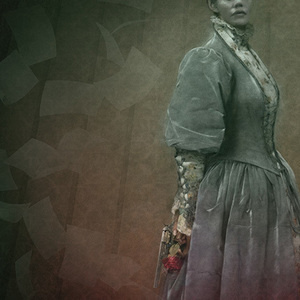“Hedda Gabler,” is, in short, a portrait of a woman who wants power, and does everything she can to obtain it. She goes to extreme measures for this, only to result in a devastating ending.
Written by Henrik Ibsen and directed by Jackie Apodaca, the play starred Angela Hernandez in the lead of Hedda Gabler, with an incredible cast of actors, each role and character intense and amazing. Each actor gave it their all, putting on a stunning performance for the closing night.
The show was put on in the Black Box, with a simplistic yet powerful set of the Tesman’s living room. The set itself didn’t subtract from the intensity of the story, instead providing the necessities of each scene, reminiscent of the Tesman’s trying to provide the basics for themselves, instead of the lavish lifestyle Hedda so desires. Another thing that was interesting about the Black Box for this specific show was the way it was set up; usually, it is a thrust stage (where the audience is on three sides), but this time, it was a “theater in the round,” where the audience is surrounding the stage from all sides (more specifically, in this case, from four sides). This is an interesting take on the Black Box, because an audience member sitting on one side can notice something completely different than an audience member sitting on another side.
All around the Black Box, hanging from the rafters, were windows, painted slightly to look like stained glass. At one end of the stage hung the portrait of Hedda’s father, General Gabler, who watched over each and every scene, like an overwhelming presence in Hedda’s life, even though he is long dead.
The crowd was packed and excited to see the closing of this marvelous show, and throughout the show was engrossed with the happenings of each of the characters, with laughs, gasps, and even bouts of silence at all the right times.
The play revolves around Hedda, George, as they begin to settle into their married life, with Hedda becoming increasingly bored with her husband’s studious practices and craving the lavish lifestyle she was so used to. They are visited by George’s Aunt Julia (Taya Dixon), their friend Judge Brack (Rob Pelfrey), Thea Elvsted (Wren Eustis), and their maid Berte (Hannah Berg) throughout the play, with each character adding another layer of tension and drama.
When news of George’s literary rival, Eilert Lovborg (played by Samuel Campbell), comes back to the city, trouble ensues. Each actor gives a stunning performance that drew the audience members deeper and deeper into a web of lies and drama, and bringing their characters–and this story–to life.
Throughout the show were rooted themes of scandal, power and the powerless, and the desire to break free from the bonds holding one down. At the end, when Hedda realizes she will never be free because of the choices she makes, she kills herself, with the sound of the pistol echoing through the theater.
Without a doubt, this play gets a 10/10 rating. A phenomenal show, I would highly seeing more of what OCA has to offer this year.



